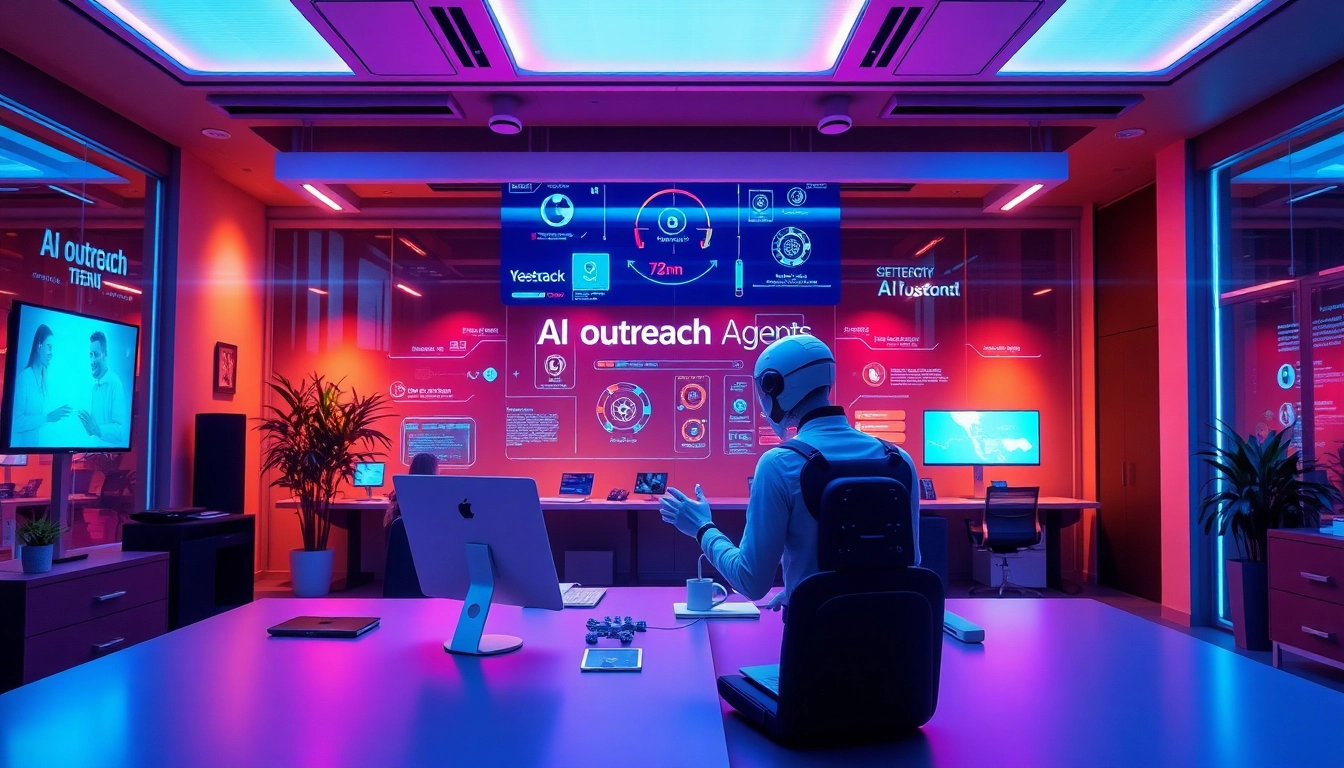Understanding AI Outreach Agents
Definition of AI Outreach Agents
AI outreach agents are specialized artificial intelligence systems designed to automate various tasks within sales and marketing frameworks. They function primarily by managing repetitive and manual activities traditionally performed by sales representatives and marketing professionals. These agents enable organizations to significantly enhance their outreach capacity and efficiency in engaging potential customers. By executing tasks such as sending emails, managing follow-ups, and even scheduling meetings, AI outreach agents empower teams to concentrate on higher-value activities, including building meaningful customer relationships and closing sales deals.
Key Features and Functions
AI outreach agents come equipped with several key features designed to streamline sales processes. These include:
- Automation of Routine Tasks: These agents can effortlessly handle repetitive tasks such as data entry, follow-up reminders, and even responses to routine inquiries.
- Integration with CRM Systems: Many AI outreach agents can seamlessly integrate with existing Customer Relationship Management (CRM) systems, ensuring that all communication and data are logged and accessible.
- Advanced Analytics: They leverage data analytics to optimize outreach efforts, providing insights into what strategies are working and where improvements are needed.
- Personalization: Using AI-driven algorithms, these agents can tailor communications to suit individual preferences and behaviors, enhancing customer engagement.
- Learning Capabilities: Many AI outreach agents can learn from interactions and outcomes, continuously refining their approaches to improve engagement rates and effectiveness.
The Role of AI in Sales Automation
The role of AI in sales automation is pivotal; it transforms how businesses operate in the modern marketplace. By utilizing machine learning algorithms and natural language processing, AI outreach agents can process vast amounts of data quickly, identifying trends and opportunities that human teams might miss. This allows sales organizations to automate their outreach efforts while maintaining a personal touch. Furthermore, AI can help identify the best times to reach out to prospects and suggest the most effective communication channels, thereby increasing the chances of successful engagement. Ultimately, AI outreach agents contribute significantly to operational efficiency, allowing sales teams to focus their efforts where they matter most—on closing deals and nurturing customer relationships.
Benefits of Using AI Outreach Agents
Increased Productivity for Sales Teams
One of the most prominent benefits of employing AI outreach agents is the significant boost in productivity for sales teams. By taking over mundane and time-consuming tasks, these agents free up valuable time for sales representatives to focus on strategic activities. Research indicates that sales professionals spend up to 60% of their time on administrative tasks. With the implementation of AI outreach agents, organizations can reduce this burden and allow their teams to dedicate more time to selling and relationship-building activities. This shift not only enhances individual performance but also improves overall team morale and job satisfaction, as salespeople can concentrate on their core competencies.
Personalized Customer Interactions
Personalized communication is crucial in building strong customer relationships. AI outreach agents excel at customizing interactions based on data analysis of customer behavior and preferences. For instance, they can analyze past interactions to determine the best approach for future communications, tailoring messages that resonate with individual customers. This level of personalization can significantly improve customer engagement, boosting responses to outreach efforts. In fact, studies show that personalized email outreach generates six times higher transaction rates compared to non-personalized approaches. By utilizing AI outreach agents, businesses can create richer, more tailored experiences for their customers, setting the foundation for long-term loyalty and satisfaction.
Data-Driven Decision Making
The integration of AI outreach agents into sales processes provides organizations access to a treasure trove of data. These agents can analyze performance metrics, customer behavior, and market trends, transforming raw data into actionable insights. Decision-makers can leverage these insights to inform strategy, allocate resources effectively, and optimize outreach efforts. For example, AI can identify which types of messaging resonate most with different customer segments, guiding sales teams on how to communicate more effectively. Moreover, AI outreach agents can also track the success rates of various campaigns in real-time, allowing for rapid adjustments to strategies based on what is working and what is not. This data-driven approach enhances overall effectiveness in outreach and significantly increases return on investment (ROI).
Implementing AI Outreach Agents in Your Business
Choosing the Right AI Tools
Implementing AI outreach agents requires careful selection of tools that align with your organization’s specific needs. The market offers a variety of AI solutions, and it’s essential to assess the features, integration capabilities, and user experience of each tool. Factors to consider include:
- Compatibility: Ensure that the AI tools you choose can seamlessly integrate with your existing systems, such as CRM platforms and marketing automation software.
- Functionality: Evaluate the range of features offered by different AI agents. Consider whether they can handle the specific tasks your team needs, such as email outreach, lead scoring, or performance analytics.
- Scalability: As your business grows, your outreach needs may also change. Select a solution that can scale to accommodate your evolving requirements.
- Support and Training: Ensure that the vendor provides good customer support and training resources to help your team get the most out of the platform.
Integrating AI with Existing Systems
Successfully integrating AI outreach agents with your existing systems is crucial for maximizing efficiency. This involves:
- Data Migration: Ensure that historical data is transferred accurately to the new system. This step is essential for maintaining continuity in customer relationships and outreach efforts.
- API Connections: Use application programming interfaces (APIs) to facilitate seamless communication between AI tools and existing systems, such as CRM software, email platforms, and project management tools.
- Customization: Tailor the AI outreach agent’s settings to align with your business processes. This might include customizing workflows, reporting metrics, and user permissions to fit your specific environment.
Training Your Team for Success
The success of AI outreach agents largely depends on how well your team adapts to using them. Effective training will ensure that team members are equipped with the skills and knowledge needed to collaborate with AI effectively. To facilitate this, consider:
- Hands-On Workshops: Organize training sessions that allow team members to familiarize themselves with the AI tools in a hands-on environment. This practical experience will help them understand how to leverage the technology in their daily workflows.
- Developing Best Practices: Encourage collaboration among team members to share tips and strategies for effective use of the AI outreach agents. This knowledge-sharing can lead to the establishment of best practices that further enhance productivity.
- Continuous Learning Opportunities: AI technology is constantly evolving. Provide ongoing training resources and encourage team members to stay updated on new features and functionalities that can improve their outreach efforts.
Challenges and Considerations
Addressing Common Misconceptions
As organizations consider implementing AI outreach agents, several misconceptions may arise. One common myth is that AI will completely replace human jobs. In reality, AI is designed to assist rather than replace human effort. By automating routine tasks, it allows sales professionals to focus on building relationships and closing deals, roles that require human empathy and understanding. Furthermore, organizations should be aware that without a robust strategy for integrating AI, there can be challenges in achieving the desired outcomes, such as productivity improvements and better customer engagement.
Data Privacy and Security Concerns
When utilizing AI outreach agents, organizations must also navigate the waters of data privacy and security. With personal data handling becoming increasingly scrutinized under regulations like GDPR (General Data Protection Regulation) and CCPA (California Consumer Privacy Act), businesses must ensure that their use of AI systems complies with these standards. This includes:
- Data Anonymization: Whenever possible, ensure that personal data is anonymized to protect individual identities.
- Transparency: Be transparent with customers about how their data is being used and processed by AI systems.
- Security Measures: Utilize robust security protocols to protect sensitive data from breaches and unauthorized access.
Balancing Automation with Human Touch
While AI outreach agents can significantly improve efficiency, organizations must intentionally balance automation with a human touch. Customers still value personal interactions and genuine conversations, particularly during critical stages of the sales process. To achieve this balance, consider:
- Strategic Touchpoints: Use AI to handle initial interactions, but designate human representatives for follow-ups or when addressing complex inquiries that require empathy and deep understanding.
- Feedback Loops: Encourage sales representatives to provide feedback on AI interactions, allowing for continuous refinement of the AI outreach approach while ensuring that the human aspect is always front and center.
Future Trends in AI Outreach Agents
Emerging Technologies in Sales
As the landscape of sales continues to evolve, emerging technologies are shaping the future of AI outreach agents. Some notable trends include:
- Integration of Natural Language Processing (NLP): Enhancements in NLP will allow AI outreach agents to communicate in more human-like ways, making interactions feel more personal and genuine.
- Increased Use of Predictive Analytics: AI systems will leverage predictive analytics to forecast customer behavior and personalize outreach strategies further.
- Chatbot Evolution: Chatbots are becoming increasingly sophisticated, enabling them to handle more complex interactions and customer queries autonomously.
The Growing Market for AI Solutions
The demand for AI outreach agents is projected to continue growing as more organizations recognize their potential to enhance efficiency and drive sales success. Companies are seeking to adopt AI solutions to stay competitive, leading to an influx of innovative AI platforms designed specifically for sales and marketing teams. This growing market presents opportunities for businesses to capitalize on technological advancements, offering tailored solutions that meet their unique sales needs.
How to Stay Ahead in the Competitive Landscape
To remain competitive in a rapidly evolving market, organizations should embrace a proactive approach towards AI outreach agents. This includes:
- Investing in Continuous Training: Keep your teams informed and well-versed in the latest advancements in AI technology, ensuring they leverage tools to their fullest potential.
- Monitoring Industry Trends: Stay abreast of industry trends, acknowledging shifts in customer expectations and technology advancements that could impact outreach strategies.
- Experimenting with New Strategies: Encourage a culture of experimentation, where teams feel empowered to test new ideas and approaches in their outreach efforts, analyzing results to learn and grow.















Leave a Reply